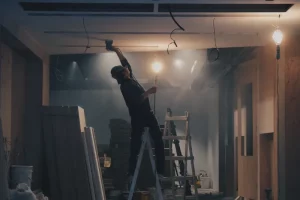
Imagine building or renovating the home of your dreams.
You move in just before the first big, Texas storm, and within hours your bedroom is full of water, your drywall is mush, and all your belongings need to be professionally cleaned or replaced.
Your builder or contractor will need to answer a lot of questions!
As a Texas resident, any claims you have against the builders of your home will be subject to a complex law known as the Texas Residential Construction Liability Act (RCLA).
Despite its complexity, the RCLA has one simple purpose: to help protect Texas residents who build or renovate their homes.
Texas residential construction is booming, and with that level of demand and pace of construction, defects are bound to arise.
The RCLA lays out a process for providing notice and filing a residential construction defect lawsuit.
In this post, the construction law attorneys at Massingill will explain how to navigate the RCLA and common things to look out for when bringing claims under the act.
If you have any questions, please contact us today.
What is the Texas Residential Construction Liability Act?
The RCLA lays out a formal process that homeowners need to follow when bringing a suit against a contractor for a residential construction defect.
The RCLA has several key definitions that homeowners should be aware of before filing suit.
First, the definition of the term “construction defect” is broad. The definition of construction defect includes:
- The failure of the design, construction, or repair of a home, an alteration thereof to meet the applicable warranty and building and performance standards during the warranty period and
- Any physical damage to the home or its real property and appurtenances caused by that design, construction, or repair failure.
Second, the term “residence” has a legal definition under the RCLA as well.
Under the act, a residence is defined as real property and any improvements thereon, such as a single-family home, duplex, triplex, or quadruplex.
Residence can also mean a unit and the common elements in a multi unit residential structure—in other words, a condominium.
Putting these two concepts together, if you have a construction defect in your residence, you may be protected under the RCLA.
An experienced construction lawyer can help you learn more about your rights.
What Steps Should a Homeowner Take If a Lawsuit Is Necessary?
Before filing a lawsuit, a homeowner must provide 60 days’ notice of their intent to file under the RCLA to the contractor who performed the defective work.
This notice must include descriptions of all known defects that might be subjects of the lawsuit.
Often, the contractor will ask a homeowner for supporting evidence, such as the nature of the defect (e.g.Is it structural or cosmetic?), along with photographs or videos of the defect in question.
How Long Do I Have to File a Residential Construction Liability Act Lawsuit in Texas?
Many times, defects are not seen immediately by homeowners, which is why the statute of limitations, or the timeframe a homeowner can take legal action, is four years for a breach of contract or warranty.
For claims related to product liability or negligence, the time limitation is two years.
For example, if a homeowner has been in their home for one year and finds that the plumbing leaks due to a defective part, they have two years to initiate an RCLA claim.
The discovery rule can be critical for calculating limitations.
This rule allows a plaintiff to defer the statute of limitations accrual date when the problem is inherently undiscoverable and is objectively verifiable.
For example, where a homeowner cannot tell if hidden flashing has been properly installed around the window frames and it is shown that after heavy rainstorms that the windows leak, the discovery rule may allow the statute of limitations to begin running from when the homeowner first noticed the leaks rather than when the windows were improperly installed.
How a Construction Law Attorney at Massingill Can Help
Our experienced construction lawyers at Massingill know how devastating it can be to find out your long-awaited dream home was merely a mirage.
After years of saving, waiting, and hard work, you deserve to have the home you hoped for and paid for.
We understand the importance of holding construction industry professionals accountable and will zealously represent you to get the best result possible for your circumstances.
Contact us today to set up a free consultation to learn more about how we can help with your individual situation.


